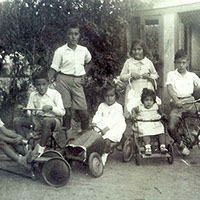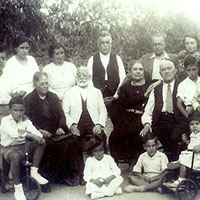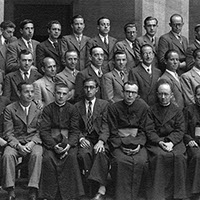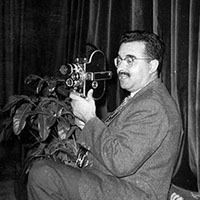


Joan Capdevila Nogués: cineasta
© by Ignasi & Joan Barjau - 2014. Amb la col·laboració de Rosa Saz (Filmoteca de Catalunya) i Montse Bailac (TVC S.A.)
Joan Capdevila Nogués, first-born son of Joan Capdevila Duran and of Antònia Nogués Batlle, was born in Barcelona October 30, 1921. At two years the family went to live in Premià de Mar (Barcelona), where four brothers were born: Concepció, Antoni, Montserrat and Ramon (who died two months after being born).
Joan always considered himself from Premià de Mar. There he began his education, first at the nursery school, and then his first teaching was done at the School of the Brothers of the Christian Schools, popularly known as "the Hermanus." In 1934, he began his second training at the La Salle school in Manlleu, at boarding school. There he made friends with colleagues in Barcelona, a friendship that lasted all his life.
In 1936 he suffered the consequences of the civil war. His father was a victim of the revolution and was killed by the control patrols (uncontrolled), with the consequent dispersion of the family. Joan, truncated the studies, began to work to help the support of the family, also helped by the close relatives of his parents.
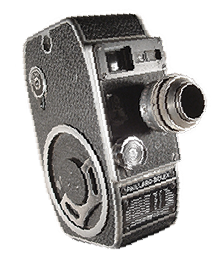 His activity as "amateur filmmaker" began with an 8mm Bolex-Paillard camera.
His activity as "amateur filmmaker" began with an 8mm Bolex-Paillard camera.
One of the first films he made was “La Vall Ferrera / The "Vall Ferrera" river valley” (1955), fon a trip with his brother Antoni and a friend of them two. This film was one of his favorites, because it was one of his first productions and for its recognized quality.
Later he worked with 16 mm cameras, producing documentaries of all kinds, of which we can emphasize the filming of surgical interventions, as a result of the contacts originated when he worked in Mútua Naviera. In addition to medical and industrial productions, it is also worth mentioning those of a historical or artistic nature, such as the concerts of the Orfeó Català, the premiere of "El Pessebre" by Pau Casals in Sant Miquel de Cuixà, with the direct on of the author, or the visit of Pau Casals to Sant Salvador del Vendrell.
And many other films in Montserrat, with Escolania, or with religious ceremonies presided over by Abbot Aureli M. Escarré, among other events.
(text: Antoni Capdevila Nogués, 2013)
Most of his productions - more than 150 - were bequeathed to the Filmoteca de Catalunya. Among these films, most shot in 16mm, include:
Barcelona marinera / Barcelona-by-the-sea (1960)
Balada del Delta de l'Ebre (1962)
(see the listings in the filmography section)
After the civil war (1936 - 39), he was able to enter the Transmediterranean Company, where his father had worked. It was intended for Mútua Naviera, who put him in contact with the maritime environment, which through the Maritime Museum of Barcelona gave way to his artistic line. In the same job, he began a relationship with doctors who always lasted.
After the Transmediterranean Company, he worked in the company "Gallina Blanca" by Lluís Carulla, where he produced several documentary films on the various activities of this company.
With the help of friends he had made in Manlleu, he entered the hiking environment, becoming a member of the Excursionist Center of Catalonia, where he began to practice photography and amateur cinema. He was also a prominent member of the Catalonia Photographic Association (cinema section).
Another hobby at that time was amateur theater, which he did at the Catholic Action Center of Santa Maria del Mar, where he performed with Joan Camprubí, known as Joan Capri's artistic name.
He was also an active singer of the Orfeó Català for many years.
Firsts years
"Amateur" filmmaker
Working life and leisure
Biographic documents


